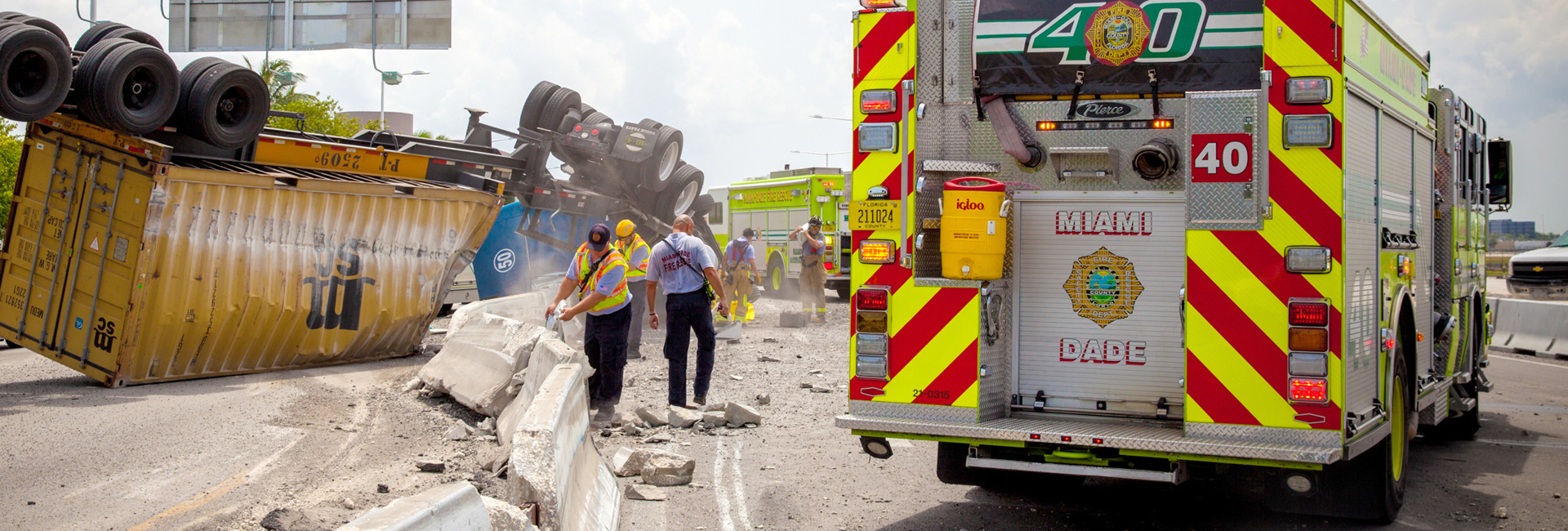- Smoke Alarms
Properly installed and maintained, smoke alarms will give residents those crucial minutes they will need to escape. - Fires
Each year, more than 4,000 Americans die and more than 20,000 are injured in fires, many of which could be prevented. - Fire Extinguishers
Follow these simple guidelines to help you find the perfect fire extinguisher for all your lifesaving needs, determine when to use it and know how to operate it. - Burglar Bars
Security bars may help keep your family safe from intruders, but they can also trap you in a deadly fire. - Emergency Escape Planning
Your ability to get out depends on advance warning from smoke alarms and advance planning. Here are some guidelines for creating your home escape plan. - Cooking
There are many simple steps you can take to prevent a fire while cooking, and to protect against injury if a fire does occur. - Barbecue
There are many common hazards to consider when using a barbeque grill. See some precautions to help keep your grilling safe. - Portable Space Heaters
Portable space heaters pose a greater risk of causing a fire than central heating units. Safety must be a top priority when using these portable heating systems. - Mobile Homes
There are many benefits to living in mobile homes, but residents should be aware of some safety concerns unique to these structures.
- Smoke Alarms
- Home Safety for the Elderly
One in every three senior citizens over 65 falls each year, and the numbers are even higher for seniors over 75 years. - Hurricane Guide
Read our 2018 Official Hurricane Readiness Guide. - Hurricane Hazards
Hurricane preparedness isn't just about protecting your family and property against the effects of extreme wind and rain. - Electrical Hazards
Even though improved safety engineering on electrical products and strict enforcement of electrical codes have reduced electrical hazards, thousands of people are seriously injured or killed by electrical shocks and fires every year. - Carbon Monoxide
Carbon Monoxide (CO) is a colorless, odorless and tasteless gas and it demands recognition by existing in the form of a deadly "stealth" gas that can cause serious illness or death with little or no warning. - Babysitting
Read some safety tips for parents and another set for babysitters, although everyone should read both sets of guidelines so that both parties are aware of the other's concerns.
- Home Safety for the Elderly
- Winter Holidays
Festivities can easily turn to tragedy if we don't look out for some typical holiday hazards. - Cold and Dry Weather
When cold weather approaches, Miami-Dade Fire Rescue Department reminds residents to take the time to prepare for the drop in temperatures. - Fireworks
According to the National Fire Protection Association (NFPA), each year more than 10,000 fireworks-related injuries are treated in emergency rooms across the United States. - Summer Weather
During a typical year in the US, heat waves kill more people than all other natural disasters combined. - Halloween
The trick-or-treaters of today now have the modern challenge of safety to consider. Here are some tips to keep your little villagers safe on Halloween night. - Inclement Weather
Exercising a high level of caution during inclement weather conditions is necessary in order to ensure your safety.
- Winter Holidays
- Beach Safety
It is crucial that you know your own swimming abilities and the abilities of your companions, especially if they are children. - Drowning is Preventable
It takes only inches of water for a small child to drown so taking extra safety steps at home and around pools, spas and all bodies of water can prevent drowning incidents. - Bites and Stings
If someone has been stung by many bees at once or has an allergic reaction to the stings, call 911. - Pool Safety
Florida ranks third in the nation for all drowning fatalities, and Miami-Dade County leads the state. - Boats & Personal Watercrafts
The vast majority of boating accidents are caused by operator-controlled factors and not by the boat, equipment or environmental factors. - Lightning
Keraunomedicine is the medical study of lightning casualties, and this word is significant to Floridians because we lead the nation in lightning deaths and injuries by a landslide. - Walking
We can attempt to educate drivers until we turn blue, but in the end, the hard fact of life in Miami is that pedestrians will never be able to rely on driver responsibility. - Travel Safety Tips
When traveling in unfamiliar territory, plan your route ahead of time and choose large, well-marked and well-maintained roads.
- Beach Safety
- Driving During the Holidays
The holiday season between Thanksgiving and New Year's Day is one of the nation's busiest and most dangerous times to drive. - Children Going to School
If you drive your children to school, the number one rule is for everyone to buckle up. The congestion of hurried buses and cars around the school can be dangerous. - Move Aside for Emergency Vehicles
Every year in the United States, there are nearly 16,000 accidents involving fire rescue vehicles responding to emergencies. - Teen Drivers
Nearly 4,000 drivers nationwide between the ages of 15 and 20 are killed in traffic crashes every year, the leading cause of death for this age group. - Low-Visibility Driving
Learn the eight things to do while driving with low visibility. - Roadside Emergencies
Minimize the potential for roadside problems by making sure that you adhere to a regular maintenance schedule for your car and never delay attending to a known or suspected problem. - Car Safety Seats for Infants and Small Children
Most parents and caretakers know the importance of car seats and most drivers make sure that all children are properly restrained.
- Driving During the Holidays
- Seasonal and Pandemic Flu
According to the Centers for Disease Control (CDC), every year in the U.S. an average of 200,000 people are hospitalized for flu, and nearly 36,000 people die from flu or flu-related complications. - Cardio-Pulmonary Resuscitation (CPR)
CPR stands for Cardio-Pulmonary Resuscitation and whether you prefer the three-letter term or the full word version, it means the same thing: a chance for survival. - Snakes and Snake Bites
Familiarize yourself with what to do (and not do) during an unexpected snake encounter. - Biological Threat
A biological attack is the deliberate release of germs or other biological substances that can make you sick. - Poisoning
Millions of people, mostly young children, are unintentionally poisoned every year. A poison is defined as any substance that can cause unintended symptoms or harmful effects. - Cardiac Emergencies and Defibrillators
Defibrillation works by sending an electrical shock through the heart muscle in an attempt to reset the heartbeat. - Burns & Scalds
There will always be some accidents that can't possibly be predicted, but for the most part, minor burns and scalds are the result of actions or behaviors that were unsafe from the beginning. - Bleeding Emergencies
Serious injuries don't always bleed heavily, and some relatively minor injuries can bleed profusely. - Head & Facial Injuries on a Child
Head injuries can be tricky, especially for young children who are unable to express themselves.
- Seasonal and Pandemic Flu

Fire Rescue
Raied "Ray" JadallahFire Chief
R. David Paulison Fire Rescue Headquarters
9300 NW 41st Street,
Miami, FL 33178-2414
786-331-5000

